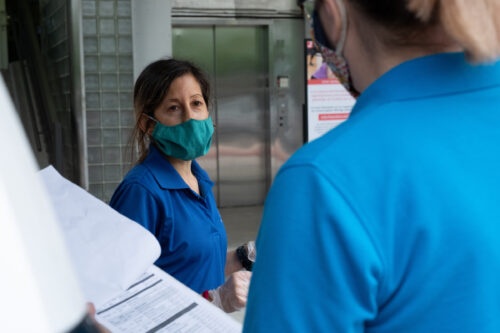
As seen in the New Jersey Jewish News:
This week, a strange thing happened at the hospital where I am a chaplain: employees could walk around without masks. We still need to wear them in places they are required – like a surgical OR, or in a room which says ‘airborne precautions’ on the door. But otherwise, masks aren’t required. Walking around the hospital without a mask feels somehow illicit, unsafe, excessively revealed. Having an uncovered face is also disorienting. I started full-time at the hospital in February 2020, so I had only seen many of my colleagues masked. Having faces to interact with rather than just eyes is like meeting people all over again.
This sea change has been brought about by a previously unheard-of statistic – the Covid patient count has been hovering in the low single digits for the last few weeks. I imagine that one day in the not-too-distant future there will be no Covid patients in my hospital.
The atmosphere of the hospital is difficult to describe. It reminds me of Florida, where I grew up, which has frequent hurricanes and tornadoes. As soon as it’s safe after a storm, people emerge and walk around to check on their neighbors and see what’s left of their neighborhoods. People’s expressions are dazed, uncertain. That’s what I see around me in the hospital – uncertainty. People are trying to assess what’s been lost and where to go from here.
Three-plus years is a long time to interrupt a life. We have emerged into a different place. Everyone has lost forward progress and time. Many people have lost family and livelihoods. The future feels very uncertain. All of us have spent the pandemic in what we chaplains refer to as “liminal space.” The internet helpfully provides this definition of liminal space:
Liminal space refers to the place a person is in during a transitional period. It’s a gap, and can be physical (like a doorway), emotional (like a divorce) or metaphorical (like a decision).
Humans do poorly with uncertainty. We cope better with the certainty of a bad outcome than with the uncertainty of good. The pandemic was a journey through deep physical and emotional uneasiness – no one knew what life would be like on the other side. That’s exactly the space in which most chaplaincy work takes place.
As a chaplain, I accompany people on their journeys through liminal space – the Hebrew term for chaplain is melaveh ruchani, spiritual accompanier. Chaplains work in spaces where people are likely to have liminal experiences: prisons, the military, and hospitals, to name a few. Since I work in a hospital, I usually work with people recovering from trauma, going through chemo, recuperating from surgery, dying (perhaps the biggest liminal space.) No one I work with knows where or how their journeys will end. All they have is hope, or forbearance, or sometimes just a desperate will to keep going. Despite my experience helping others, I am not any better than the average person at managing my own uncertainty. For comfort and inspiration, I typically turn to Tanach, the Jewish bible. I find reading how our ancestors coped with their journeys through difficult transitions helpful when trying to navigate my own.
One of the most profound liminal spaces in Tanach is Moses’ time on Mount Sinai. While Moses was up on the mountain receiving the Torah, he was shrouded in clouds. The Jewish people, waiting impatiently at the base of the mountain they had been prohibited to touch, had no way to know what was happening at the top. Even though God had told them what was to happen, once Moses was out of sight they were terrified they had been abandoned. While Moses was receiving detailed instructions for how the Jewish people were to become a moral and ethical people, they instead engaged in the most scandalous and immoral behavior possible – they desecrated their own covenant and created a golden calf to worship. They preferred the certainty of bad to the uncertainty of good.
In their terror, the Jewish people cried out to Aaron, Moses’ brother who was in charge in Moses’ absence: “This Moses, who brought us out of the land of Egypt, we don’t know what has happened to him!” I wonder if there might have been a better outcome if Aaron had offered compassion and support rather than responding “Hey, men, grab everyone’s gold earrings and bring them to me.”
The pandemic was unexpected and disastrous for many, much like a terrible storm. The rebuilding tasks ahead seem gargantuan, even impossible. Yet we know from sacred texts that humans have an amazing propensity to overcome the most difficult challenges. We can engage in positive, even God-emulating behavior when we choose to compassionately support each other in community.
Sefirat HaOmer is a traditional Jewish practice which marks each of the 49 days between the holidays of Passover and Shavuot. Passover commemorates freedom from enslavement. Shavuot celebrates receiving the Torah on Mount Sinai. The journey between experiencing the injustice of slavery and deserving the freedom to build a society founded on justice was a large one. Many changes had to happen between the redemption from Egypt and revelation at the foot of Mount Sinai. Even facing Mount Sinai, people were emotionally unprepared to face the future.
As Sam quotes his father in Tolkien’s The Lord of the Rings, “It’s the job that’s never started as takes longest to finish.” The door is now open to our post-pandemic future. Though the present may not be what any of us had in mind four years ago, the time for revelation, re-visioning, and rebuilding is at hand.

